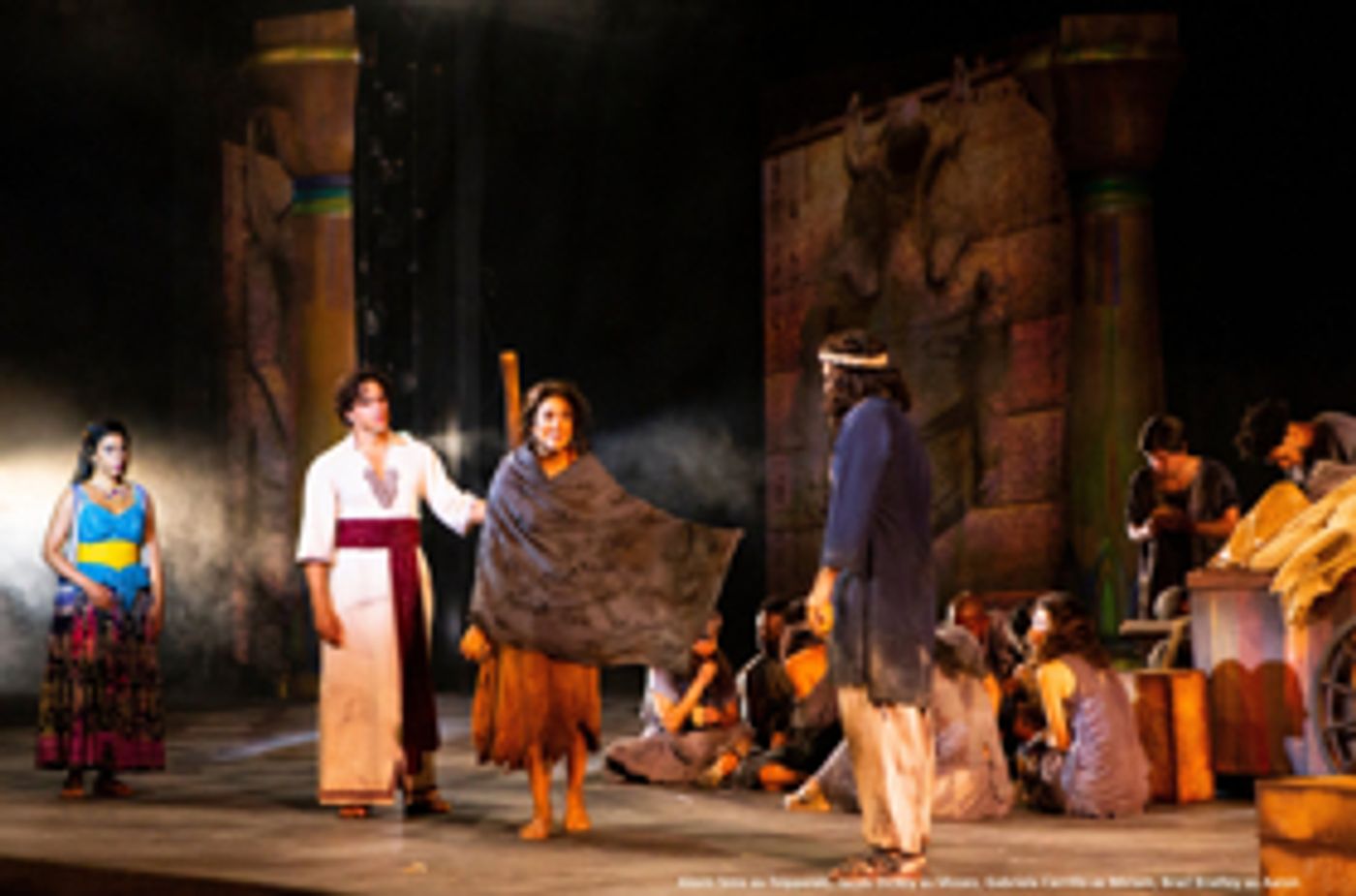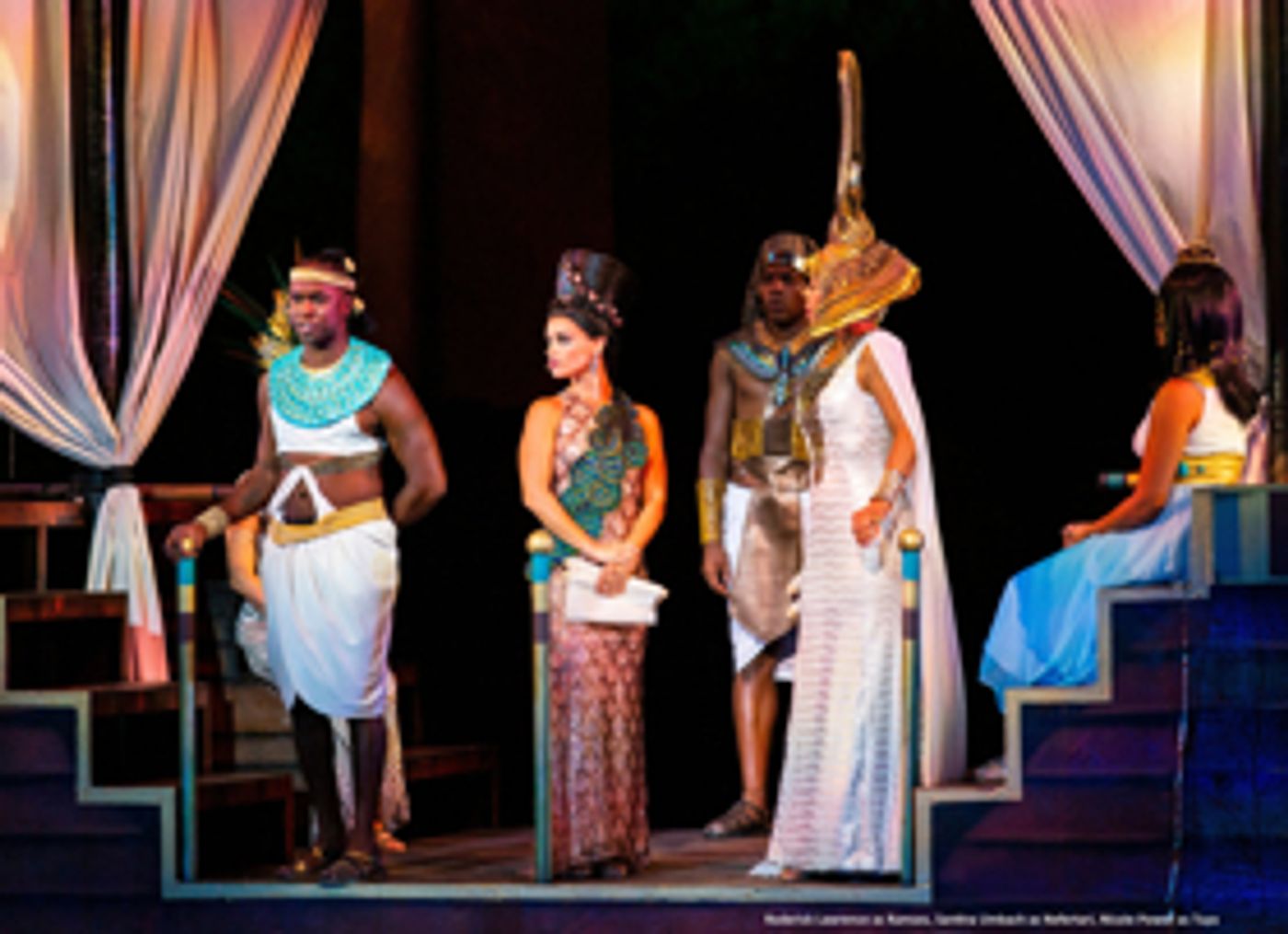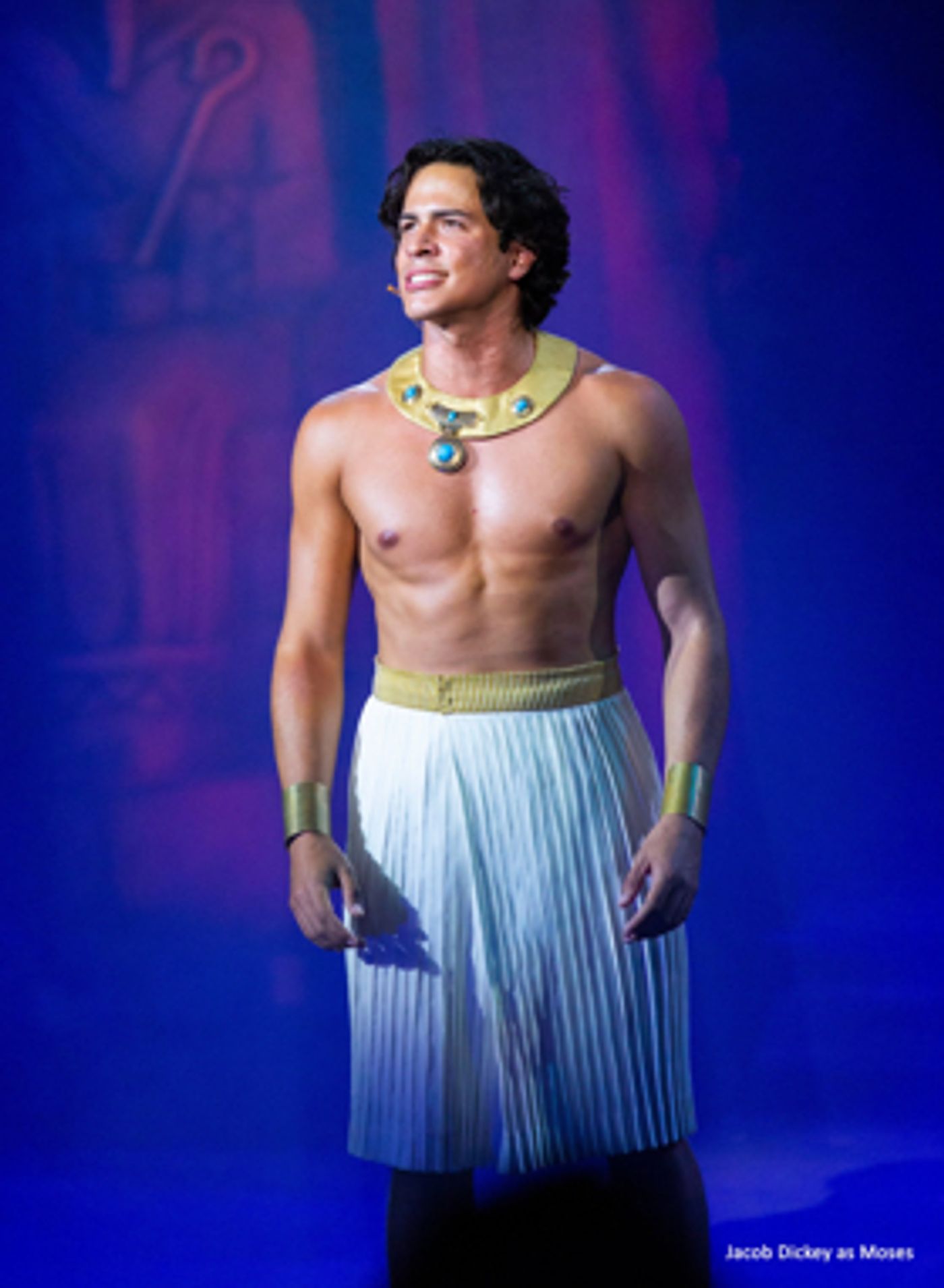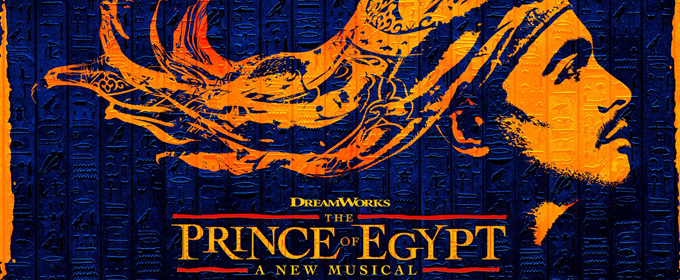Review: THE PRINCE OF EGYPT at Tuacahn is a Breathtaking Gift

THE PRINCE OF EGYPT at the Tuacahn Amphitheatre is a breathtaking musical with originality and depth, theatricality and spectacle. It is one of the very first productions of the show in the world, only preceded by a co-production by TheatreWorks in Silicon Valley and the Fredericia Theater in Denmark, and it is a gift to anyone who has the opportunity to see it.
THE PRINCE OF EGYPT (music and lyrics by Stephen Schwartz, book by Phillip LaZebnik) is based on the beloved DreamWorks animated film of the same name. It tells the age-old story of Moses, who is raised as a prince in Egypt before learning that he is actually the son of a Hebrew slave. His brother, Ramses, has always been his best friend, but when Ramses is crowned Pharoah, Moses asks him to let his people go in the ultimate test to their brotherhood.
Schwartz and LaZebnik, who also wrote the songs and screenplay of the animated feature, respectively, and who were involved in rehearsals at Tuacahn, have chosen to focus on the humanity of the characters rather than on any specific religious aspects. In doing so they have managed to paint the picture of one of the greatest stories ever told by exploring motivations and relationships with subtle strokes that make it feel completely new while still remaining true to the original Exodus story.
The memorable new songs are a fitting addition to the stellar film score, including the Oscar-winning "When You Believe" and "Deliver Us." Moses' "Footprints in the Sand" is a highlight, but even better is a wonderfully expanded "All I Ever Wanted," along with its soaring reprise within the Act I Finale. Many motifs are expertly woven throughout the show, tightly integrated with the book.
The most affecting piece of the show is the heart-shattering choreography and staging of the death of the firstborn, filled with incredible theatricality and visceral emotion. It leads into the best new song of the score, "For the Rest of My Life," in which Moses lays his emotions bare. It's the kind of song that you feel in your bones as much as hear with your ears.
Choreographer Sean Cheeseman, who also choreographed the original production of THE PRINCE OF EGYPT, is world renowned for his work, having choreographed the film THE BODYGUARD, choreographed and judged on SO YOU THINK YOU CAN DANCE, and much more. Here he has created something very special, melding a number of different styles such as afro jazz and contemporary to tell the story in an abstract, theatrical way.  Especially captivating is his use of dancers to become the waters of the Nile, carrying the baby Moses to the palace, and later to become the sands of the desert, carrying the adult Moses to Midian.
Especially captivating is his use of dancers to become the waters of the Nile, carrying the baby Moses to the palace, and later to become the sands of the desert, carrying the adult Moses to Midian.
Director Scott S. Anderson carefully balances this understated theatricality with thrilling visual spectacle. The natural setting of the amphitheater is gorgeous, with imposing red rock cliffs that make the audience feel they are actually in Egypt as the story unfolds. The backdrop is utilized to great success by scenic designer Brad Shelton, lighting designer Cory Pattak, and projection designer Jon Infante. Massive obelisk and sphinx set pieces look as if they were hewn from the red rock, the cliffs and trees are lit in different ways at just the right moments to augment the action, and projections of effects such as lightning and fiery hail reflect from the dark cliffs to astonishing effect.
The sets are all impressively crafted to create the illusion of Egyptian grandeur, and the projections are tastefully designed to complement. The lighting is similarly successful at capturing just the right mood and elevating the visuals without being ostentatious.
The costume design by Dustin Cross manages to be opulent and rich in texture and color while avoiding garishness, and the sound design by Julie Ferrin is amazingly crystal clear.
Live animals, including camels, horses, sheep, and goats, are utilized to immerse the audience in a world that feels very real, as are heart-thumping special effects such as pyrotechnics and a parting of the Red Sea with real water that has to be seen to be believed.
Future productions will likely not have the physical canvas that is at Tuacahn's disposal, but this canny combination of theatricality with big visual spectacle is the right direction in which to head for THE PRINCE OF EGPYT.
This is a show that deserves to be seen on Broadway, not only because it is a beloved property, but because of its artistic merit. If Broadway is not is the cards, the musical absolutely must at least be preserved on a cast album before the rights are released (as was the equally deserving THE HUNCHBACK OF NOTRE DAME, with lyrics by Schwartz). Word to the wise: take Jacob Dickey along for the ride.
 Dickey, who was the first replacement for the leading role in ALADDIN both on Broadway and on tour, gives a masterful performance as Moses. He is as personable as a friend but as regal as a prince. Alternately charming, conflicted, droll, smoldering, humble, and powerful, he becomes the Moses you never knew you wanted--a Moses who takes time to come into his own as a prophet and leader. And with a singing voice like an angel, he is appropriately a revelation in the role.
Dickey, who was the first replacement for the leading role in ALADDIN both on Broadway and on tour, gives a masterful performance as Moses. He is as personable as a friend but as regal as a prince. Alternately charming, conflicted, droll, smoldering, humble, and powerful, he becomes the Moses you never knew you wanted--a Moses who takes time to come into his own as a prophet and leader. And with a singing voice like an angel, he is appropriately a revelation in the role.
Roderick Lawrence as Ramses is both petulant and commanding, depending on what is required in the moment, and he is just the right companion and foil for Moses. Alexis Sims as Tzipporah is strong and loving, making Moses a perfect match of a different kind.
Charismatic performances are given by Moses' three onstage parents: Dathan B. Williams as his adoptive father, Pharoah Seti, Nicole Powell as his adoptive mother, Tuya, and Belen Moyano as his birth mother, Yocheved.
Additional highlights of the fifty plus member cast include Santina Umbach as Nefertari, Marcus Hopkins-Turner as Hotep, Gabriela Carrillo as Miriam, Brad Bradley as Aaron, and Colin Alexander as Jethro.
As with all new musicals in development, there are still a few elements that could be fine-tuned and improved.
Like in the film, Moses and Ramses are introduced racing chariots, but this feels counter-intuitive to a stage adaptation, as it is impossible to actually replicate the speed of such a race believably. They could surely get into mischief in any number of other ways that could be better portrayed visually onstage.
One of the emotional climaxes of the film is the burning bush sequence, which here is relegated to a much more backseat role that feels anti-climactic. We need to feel why this is the inciting incident that changes Moses' trajectory in life. That could be achieved if the song is extended, allowing us to hear Moses' perception of what he has seen and what he is thinking and feeling. He does touchingly reflect on his experience to the tune of "When You Believe" at a later point, but incorporating an additional emotional reaction in the moment would help the scene conclude in a more striking way.
The opening number of Act II, "One of Us," fills its needed function as Aaron and the Hebrews struggle to accept Moses as their leader. However, some of the jokes related to Jews are very anachronistic and pull the audience out of the drama of the story.
"The Plagues" is a stirring choral number that cleverly includes sections of the Moses and Ramses duet "No Power On Earth." However, it loses the electrifying tension and energy of their argumentative solo parts in the film version, which uses a modified "All I Ever Wanted" melody. As the song builds currently, the brothers each already become more and more unyielding, so if the number could remain largely as is but then end with the more pointed lyrics and melody of the film version, it would be much more satisfying.
After the death of the firstborn, Ramses' wife, Nefertari, sings a beautiful solo called "Heartless" that shows her growth. However, the moment cries out for us to also know how Ramses is feeling as an important character onstage who has suffered the same loss. It would be very moving if he were to join his wife at the end of the song in a duet moment that shows how they have come together.
THE PRINCE OF EGYPT is a musical that is without a doubt worth continued development, and it is already very close to ready for a Broadway bow, cast album, and eventual licensing. The world deserves to see and hear the gift that the creative team and Tuacahn have already given to Utah audiences.
THE PRINCE OF EGYPT runs through October 20 at Tuacahn. For tickets, call the box office at 1-800-746-9882 or visit www.tuacahn.org.
Photo Credit: Tuacahn
Reader Reviews

Videos


